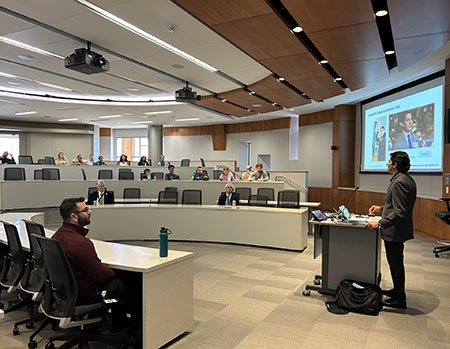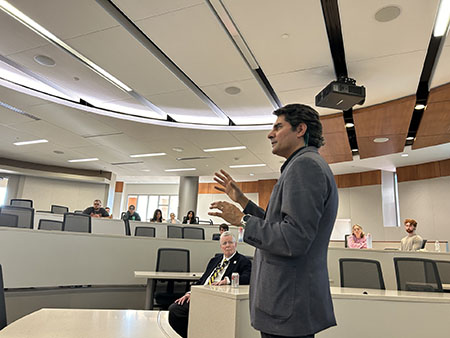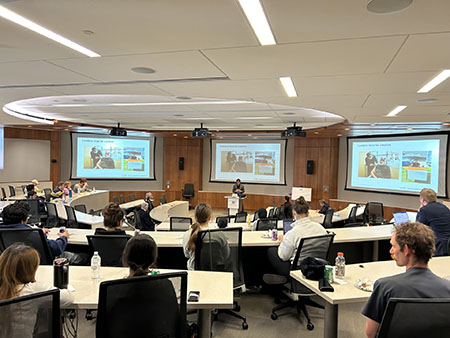
Speaking to medical students in early October at the W.E. Upjohn M.D. Campus, Bobby Mukkamala, MD, president-elect of the American Medical Association (AMA), admitted he was relatively apathetic during his time as a medical student.
But at a certain point in his career, the mindset of the Flint, Michigan native shifted.
“Eventually I decided that I wanted to fix the things that I didn’t like about healthcare,” Dr. Mukkamala explained during his October 2 visit to WMed. “We learn about healthcare, we learn about how to take care of patients in medical school, but so much of healthcare goes way beyond what we do in our exam rooms, right? ... I realized that I need more than just my knowledge and my diploma to improve the healthcare of this country.”
During his hourlong talk, “What I Wish I Knew in Medical School,” Dr. Mukkamala shared with students his experiences, insights, and vision for the future of healthcare advocacy and the role of physicians in shaping public policy.
“Nobody has more to gain or lose by this work than you,” Dr. Mukkamala told students. “You’re going to have an entire career with the consequence of your success or failure in changing the future of medicine. You are the ones that should be shaping that.”

Founded in 1847, the AMA promotes the art and science of medicine and the betterment of public health by “representing physicians with a unified voice in courts and legislative bodies across the nation,” and “removing obstacles that interfere with patient care,” according to its website.
Dr. Mukkamala has consistently contributed to healthcare advocacy, both as a practicing physician and as a leader within the AMA. He has championed key public health issues, including the fight against opioid misuse and the promotion of physician wellness, leading to meaningful policy reforms.
M2 Ramzi Haddad, president of the WMed AMA-MSS (Medical Student Section), organized the talk with Dr. Mukkamala to inspire his fellow medical students to see beyond the classroom and clinical rotations.
“Too often, we focus solely on the science and practice of medicine, but it’s equally important to understand our role in shaping the healthcare landscape,” Haddad said. “Dr. Mukkamala’s journey and advocacy efforts within the AMA show how one person can make a tangible difference in the lives of countless patients and physicians. I wanted everyone to leave the talk feeling empowered to use their voice, knowing that even as students, we have the power to drive change and contribute to a more equitable and effective healthcare system.”

Dr. Mukkamala indicated that medical student advocacy has helped create policy at the AMA on a variety of topics, including on student and residency work conditions, standardized test reforms and fairness in the match programs. He encouraged students to join the organization, noting many impactful policies “came from minds like yours.”
“We are stronger with you, we are stronger with your ideas,” Dr. Mukkamala said. “We will do a much better job with more of you as our members.”
